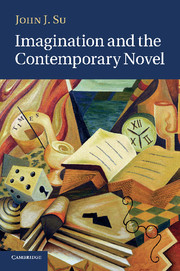Book contents
- Frontmatter
- Contents
- Preface and acknowledgments
- 1 Introduction: globalization, imagination, and the novel
- 2 Aesthetic revolutions: white South African writing and the State of Emergency
- 3 The pastoral and the postmodern
- 4 Hybridity, enterprise culture, and the fiction of multicultural Britain
- 5 Ghosts of essentialism: racial memory as epistemological claim
- 6 Amitav Ghosh and the aesthetic turn in postcolonial studies
- Conclusion: imagining together?
- Notes
- Bibliography
- Index
1 - Introduction: globalization, imagination, and the novel
Published online by Cambridge University Press: 01 June 2011
- Frontmatter
- Contents
- Preface and acknowledgments
- 1 Introduction: globalization, imagination, and the novel
- 2 Aesthetic revolutions: white South African writing and the State of Emergency
- 3 The pastoral and the postmodern
- 4 Hybridity, enterprise culture, and the fiction of multicultural Britain
- 5 Ghosts of essentialism: racial memory as epistemological claim
- 6 Amitav Ghosh and the aesthetic turn in postcolonial studies
- Conclusion: imagining together?
- Notes
- Bibliography
- Index
Summary
One of the greatest paradoxes of contemporary culture is that at a time when the image reigns supreme the very notion of a creative human imagination seems under mounting threat. We no longer appear to know who exactly produces or controls the images which condition our consciousness. We are at an impasse where the very rapport between imagination and reality seems not only inverted but subverted altogether. We cannot be sure which is which. And this very undecidability lends weight to the deepening suspicion that we may well be assisting at a wake of imagination.
Richard Kearney, The Wake of ImaginationThe image, the imagined, the imaginary – these are all terms that direct us to something critical and new in global cultural processes: the imagination as a social practice. No longer mere fantasy (opium for the masses whose real work is elsewhere), no longer simple escape (from a world defined principally by more concrete purposes and structures), no longer elite pastime (thus not relevant to the lives of ordinary people), and no longer mere contemplation (irrelevant for new forms of desire and subjectivity), the imagination has become an organized field of social practices, a form of work (in the sense of both labor and culturally organized practice), and a form of negotiation between sites of agency (individuals) and globally defined fields of possibility. This unleashing of the imagination links the play of pastiche (in some settings) to the terror and coercion of states and their competitors. The imagination is now central to all forms of agency, is itself a social fact, and is the key component of the new global order.[…]
- Type
- Chapter
- Information
- Imagination and the Contemporary Novel , pp. 1 - 19Publisher: Cambridge University PressPrint publication year: 2011



